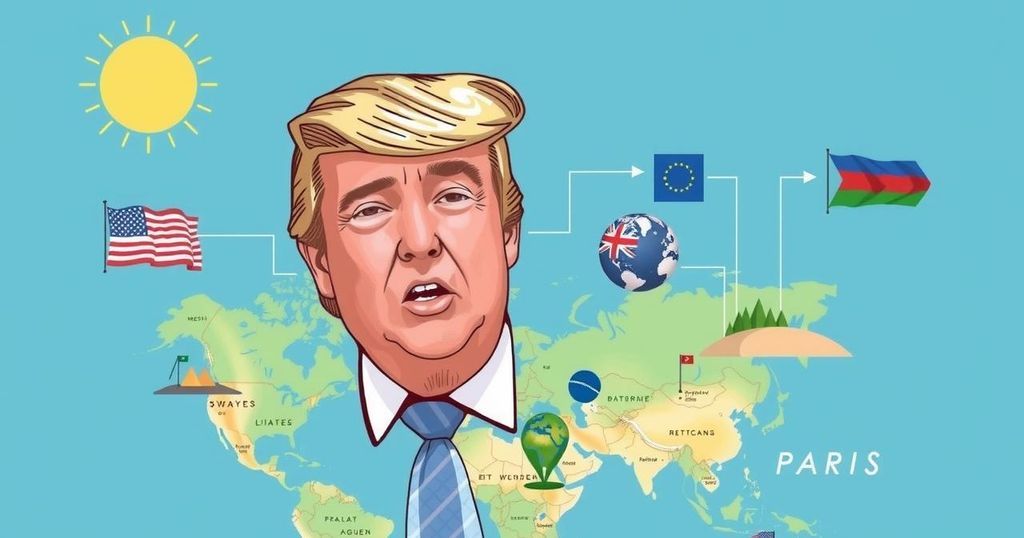Donald Trump has expressed intentions to withdraw the U.S. from the Paris Climate Agreement a second time, following a prior exit in 2020. This exit may occur more quickly than the first due to changes in political context. Experts warn of potential trust deficits and negative implications for global climate action, while supporters emphasize national sovereignty and economic advantages.
President-elect Donald Trump has signaled his intention to withdraw the United States from the Paris Climate Agreement once he assumes office, but this potential second withdrawal may differ significantly from the first. The Paris Climate Agreement, established at the U.N. Climate Change Conference in 2015, is a legally binding accord among nearly 195 parties committed to addressing climate change. The United States formally entered this agreement under former President Barack Obama in 2016, and could not withdraw until after a three-year waiting period.
When Trump first took office, the U.S. was unable to exit immediately due to the treaty’s provisions; the formal withdrawal did not occur until the end of 2020. However, following President Joe Biden’s re-entry into the agreement in 2021, Trump has indicated that if reelected, he may pursue a much quicker exit this time around, as he previously stated in an interview with Politico.
Experts like David Waskow, director of the international climate initiative at the World Resources Institute, have observed that this new timeline for withdrawal would significantly differ from the previous one. Furthermore, Max Boykoff, professor at CU Boulder, has expressed concerns that a second U.S. exit could undermine international trust and potentially inspire other nations to follow suit, as evidenced by reports of Argentina’s Libertarian President contemplating a similar course of action.
Supporters of a U.S. withdrawal advocate for the benefits, positing that it would allow the U.S. to reclaim sovereignty and avoid unnecessary emission reduction commitments that could adversely affect American competitiveness, particularly against countries like China, which does not have binding emissions targets.
There are additional suggestions that Trump should pursue further action, including submitting the treaty to the Senate for ratification, which would complicate any future re-entry efforts. Some observers have also raised the possibility of a U.S. exit from the U.N. Framework Convention on Climate Change (UNFCCC), a treaty established in 1992 aimed at combating dangerous human interference with the climate system.
Prominent figures, such as U.N. Secretary-General António Guterres, have emphasized the importance of U.S. participation in the Paris Agreement, asserting that the agreement could endure without the U.S., but at the cost of its effectiveness.
As these discussions unfold, the future of U.S. participation in international climate commitments remains uncertain, hinging on domestic political changes and global responses.
The Paris Climate Agreement was adopted to foster international cooperation aimed at mitigating climate change, involving nearly 195 countries. The agreement allows parties to withdraw after a three-year commitment period, which has previously influenced the United States’ ability to exit. Trump’s initial withdrawal process lasted until November 2020, but his potential second exit could be expedited in light of recent political developments. These dynamics raise questions about international relations and commitment to climate action.
In summary, the potential for a second U.S. withdrawal from the Paris Climate Agreement under Donald Trump raises complex issues regarding international trust and environmental policy. While supporters argue for increased sovereignty and economic efficiency, experts caution against the repercussions this could have on global climate efforts. The discourse surrounding U.S. involvement is emblematic of larger themes in international environmental cooperation.
Original Source: www.foxnews.com






